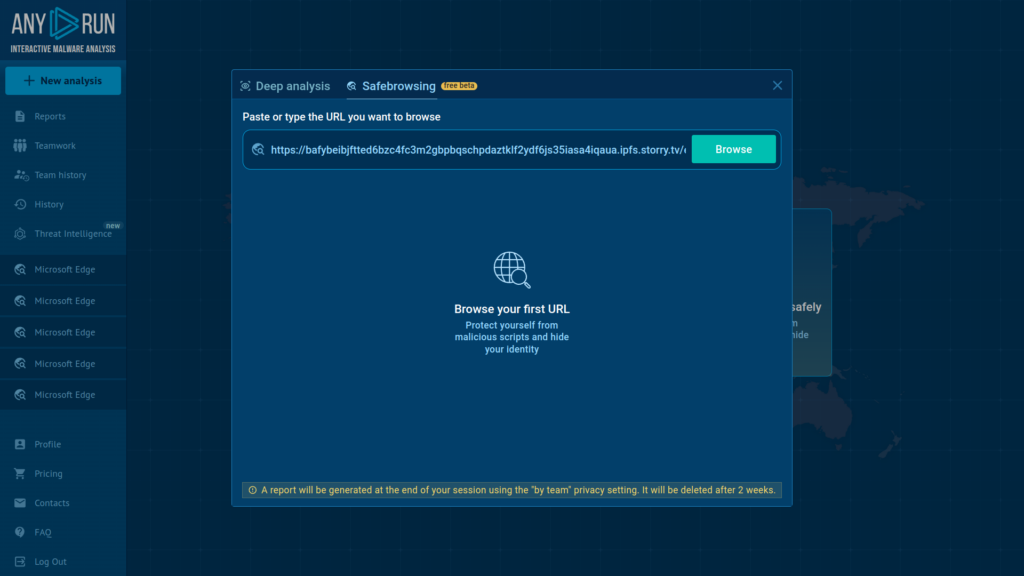Introducing Safebrowsing: Explore Suspicious Links in a Safe Virtual Browser
Current security measures against phishing links focus on automated checks and timely blocking before they reach users. Yet, some links still make it to their targets, leaving them vulnerable as they often have no simple, fast, and reliable tool at hand to check these links at the final stage.
To address this security gap, we created Safebrowsing, which makes it easy to safely and easily open any link and manually verify its content.
What is Safebrowsing?
Safebrowsing offers a fully-interactive browser in the cloud that lets you open and navigate any website as you normally would in a completely isolated and secure environment. This ensures that any malicious activity encountered during browsing is contained and does not affect your local systems or network.
With Safebrowsing, you can launch a quick virtual browser session to manually explore potentially harmful URLs. The service identifies malicious content in real time using ANY.RUN‘s proprietary technology and notifies you about it.
After each session, you receive a list of indicators of compromise (IOCs) along with a detailed threat report.
Safebrowsing gives you the ability to follow the entire chain of attack when facing phishing threats and get an in-depth network traffic analysis, including:
Connections
DNS and HTTP requests
Network threats identified by Suricata IDS
How does it work?
Safebrowsing is built to be simple and effective, letting you quickly run analysis in three steps:
Step 1: Submit URL
You enter the URL of the website you want to analyze and hit “Browse”.
Step 2: Interact and Examine Threats
You interact with the website, clicking links, opening tabs, solving CAPTCHAs, and seeing what happens after each step with your own eyes.
While you explore, the service monitors the websites for any malicious content and lets you know about the danger.
Step 3: Collect IOCs
Once you finish, the service generates a report outlining detected threats and suspicious activities, as well as lets you export packet data in PCAP.
Safebrowsing demonstration
The service quickly identifies malicious content and provides access to triggered Suricata detection rules
Check out the video above in which we investigate a phishing link using Safebrowsing.
How is Safebrowsing different from the ANY.RUN sandbox?
Unlike our advanced malware sandbox, Safebrowsing focuses exclusively on URL analysis.
It provides a less complex interface that eliminates the need for in-depth system monitoring and file system access, which makes it easy-to-use for non-experts. Yet, ANY.RUN’s signature interactivity is still there.
How is Safebrowsing different from a URL scanner?
Compared to URL scanners that simply check any given URL against a database of known malicious URLs, Safebrowsing provides a fully interactive environment for exploring websites.
What are possible use cases for Safebrowsing?
Safebrowsing is a universal tool that can be of great help in different scenarios.
Open URLs within a secure, isolated, and full-size virtual browser to prevent any potential threats from affecting your local system.
Speed up the process of analyzing and responding to suspicious links.
Make link checks safe, simple, and quick for non-security employees.
Prevent infections and increase the general level of security in the organization.
Demonstrate the risks of clicking on suspicious links as part of training on safe browsing practices.
Observe network traffic for malicious activity to detect threats in real time.
Improve detection of phishing threats thanks to ANY.RUN’s advanced capabilities.
Download traffic data and the identified indicators of compromise.
Share the completed session as evidence of malicious content.
How Safebrowsing can help your business
Phishing Protection
By allowing your team to safely explore suspicious URLs, Safebrowsing helps in identifying phishing attempts before they can impact your organization. The proactive approach significantly reduces the risk of data breaches and financial losses.
Staff Training
Safebrowsing can be used as a training tool to educate employees about the dangers of phishing and other web-based threats. By demonstrating real-world examples in a safe environment, you can enhance your team’s awareness and preparedness.
Empowering Non-Expert Employees
Safebrowsing equips non-expert employees with a fast and safe way to check suspicious links without needing to involve the security team. This saves time and resources, allowing your security professionals to focus on more critical tasks
Try Safebrowsing beta now
Real-time threat detection, fast performance, and easy-to-use interface make Safebrowsing a perfect tool for any individual and organization that wants to avoid falling victim to phishing attacks.
The FREE beta version is available to all ANY.RUN users.
Analyze your first URL right away.
About ANY.RUN
ANY.RUN helps more than 400,000 cybersecurity professionals worldwide. Our interactive sandbox simplifies malware analysis of threats that target both Windows and Linux systems. Our threat intelligence products, TI Lookup, Yara Search and Feeds, help you find IOCs or files to learn more about the threats and respond to incidents faster.
With ANY.RUN you can:
Detect malware in seconds
Interact with samples in real time
Save time and money on sandbox setup and maintenance
Record and study all aspects of malware behavior
Collaborate with your team
Scale as you need
The post Introducing Safebrowsing: Explore Suspicious Links in a Safe Virtual Browser appeared first on ANY.RUN’s Cybersecurity Blog.
ANY.RUN’s Cybersecurity Blog – Read More

